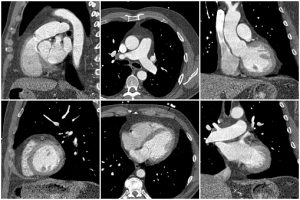 High risk of chronic kidney disease (CKD) and COPD is signaled by a high coronary calcium score. A study, conducted by Johns Hopkins researchers, examined over 6,000 individuals and followed them up at least once a year over a 10-year period. These individuals underwent a heart CT scan, which found that a high coronary artery calcium score puts people at a higher risk for heart and vascular disease, as well as cancer, chronic kidney disease, and chronic obstructive pulmonary disease (COPD).
High risk of chronic kidney disease (CKD) and COPD is signaled by a high coronary calcium score. A study, conducted by Johns Hopkins researchers, examined over 6,000 individuals and followed them up at least once a year over a 10-year period. These individuals underwent a heart CT scan, which found that a high coronary artery calcium score puts people at a higher risk for heart and vascular disease, as well as cancer, chronic kidney disease, and chronic obstructive pulmonary disease (COPD).
Assistant professor Michael Blaha said, “Plaque in the arteries is the result of cumulative damage and inflammation, and vulnerability to injury and chronic inflammation likely contributes to diseases like cancer, kidney and lung diseases, as well as cardiovascular disease. So it makes sense that the coronary calcium score — a measure of arterial aging — is predictive of noncardiovascular diseases, too. The reason the coronary calcium score may work so well at identifying vulnerability to a variety of chronic diseases is because it’s a direct measurement of the cumulative effect of all risk factors, rather than a consideration of a single risk factor, like obesity, smoking, or high blood pressure.”
Advertisement
The researchers note that this was merely an association study and that they did not uncover cause and effect.
Heart CT scans measure the magnitude and density of the mineral levels in the blood vessels nourishing the heart arteries. Coronary artery calcium is a known risk factor for heart disease and stroke. When the calcium score is zero, the risk for heart disease and stroke is low. The risk drastically increases five times with a score over 400.
After the 10-year follow-up, 1,238 study subjects were diagnosed with a noncardiovascular disease (prostate, lung, colon, breast, and ovarian cancer, kidney disease, dementia, hip fracture). Among the individuals with a score over 400, 36.9 percent were diagnosed with noncardiovascular diseases, compared to 11 percent with a score of zero.
Chronic kidney disease was diagnosed in 395 participants and 161 participants were diagnosed with COPD.
Heart disease is still the number one killer in America, resulting in over 600,000 deaths annually. Other diseases like CKD and cancer collectively cause over 780,000 deaths each year, according to the Centers for Disease Control and Prevention.
Coronary calcium scan (heart scan)
Coronary calcium scan – heart scan – allows doctors to look at an image of your heart. More specifically, doctors can look at calcium buildup in the arteries which can lead to artery narrowing that contributes to heart attack risk.
A heart scan can reveal a person’s heart disease and heart attack risk, even if one does not experience any symptoms.
Although heart scans are useful tools, the American Heart Association does not recommend routine heart scans for individuals who do not present symptoms, who don’t smoke, or those who do not possess other risk factors for cardiovascular disease.
Heart scan is a noninvasive method to determine what is going on with the heart. Because coronary artery disease is a leading cause of death and heart attack, knowing a person’s calcium score can help prevent these cardiovascular events.
Advertisement
Heart scan is most beneficial in those with a family history of cardiovascular disease, smokers, obese individuals, and those with high blood pressure and cholesterol. It also benefits individuals who have a risk between 10 to 20 percent to experience a heart attack within 10 years, because preventative measures can be put into place to prevent a heart attack.
Heart scan is not useful in individuals with a low heart disease risk – younger than 55, not overweight, nonsmokers, and with no family history of heart disease – or in individuals with a high risk of heart disease, meaning they are at a 20 percent risk of suffering heart attack within 10 years. In this situation, heart scans won’t reveal any additional information aside from what you already know and you should already be taking steps to reduce your risk of heart attack way before this point.
Furthermore, you shouldn’t have a heart scan if you’ve already had a heart attack or undergone other heart surgical procedures, as your doctor already knows you have coronary artery disease.
